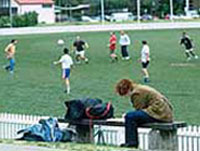Critical Issues in Restorative Justice - LAWS8117
Faculty: Faculty of Law
School: Faculty of Law
Course Outline: See below
Campus: Kensington Campus
Career: Postgraduate
Units of Credit: 6
EFTSL: 0.12500 (more info)
Indicative Contact Hours per Week: 2
Enrolment Requirements:
Pre-requisite: Academic Program must be 9200 or 9210 or 9230 or 5740 or 9285 or 5285 or 9235 or 5235 or 9220 or 5750.
Excluded: CRIM2022, CRIM3019, JURD7817
CSS Contribution Charge: 3 (more info)
Tuition Fee: See Tuition Fee Schedule
Further Information: See Class Timetable
View course information for previous years.
Description
LLM Specialisations
Recommended Prior Knowledge
Course Aims
- Demonstrate an understanding of key concepts of restorative justice;
- Engage in debate concerning restorative practices;
- Undertake research in the field of restorative justice, and critically analyse restorative justice practices.
Learning Outcomes
- Demonstrate a sound understanding of key concepts in restorative justice;
- Demonstrate a sound understanding of the suitability of restorative processes to particular situations;
- Critically examine the use of restorative justice in contemporary criminal practice;
- Examine restorative justice within the wider social and political context;
- Demonstrate effective written and oral communication skills;
- Undertake legal research and writing in the field;
- Undertake interdisciplinary research concerning restorative justice practice.
Main Topics
Conferencing
Criminal justice
Criminal law
Dispute resolution
Mediation
Non-adversarial practices
Restorative Justice
Assessment
Class presentation 15%
Research essay 70%
Course Texts
Resources









